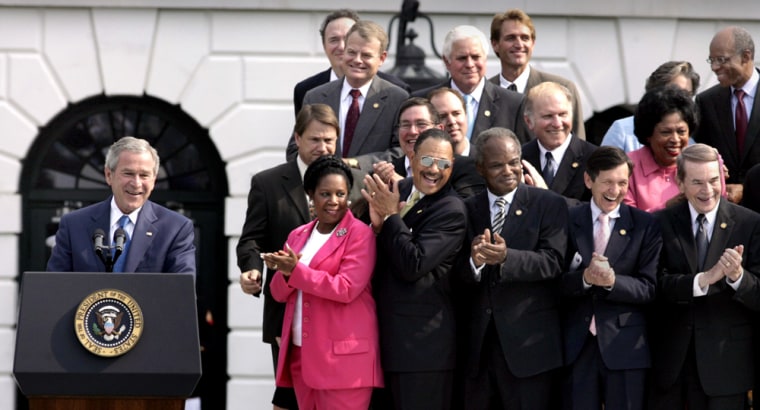Civil rights leaders said Thursday that President Bush’s signature to extend the 1960s civil rights law against racist voting practices will be just a footnote in history if the government fails to enforce it.
At a bill signing ceremony at the White House to extend provisions of the 1965 Voting Rights Act, Bush pledged to stand behind the law that opened polls to millions of black Americans.
“Today, we renew a bill that helped bring a community on the margins into the life of American democracy,” Bush said. “My administration will vigorously enforce the provisions of this law, and we will defend it in court.”
Noting the president’s words on enforcement, civil rights activist Al Sharpton said: “You can bet we’ll make sure that he keeps his pledge.”
Sharpton called on Bush to meet immediately with civil rights leaders to talk over how the Justice Department will monitor the enforcement of the act. “Today’s events represent a significant victory for African-Americans, but a complete victory it is not,” Sharpton said.
Claims of politicization
Civil rights activists accuse the Bush administration of politicizing the Justice Department’s civil rights division, and say it has turned a blind eye to voter suppression tactics, such as photo identification provisions and citizenship requirements, in states across the nation.
The Rev. Jesse Jackson said Bush rightly talked of “enforcement” and how the “work for a more perfect union is never ending.” But he said civil rights leaders must be assured that the administration will protect the law against efforts in the courts to undermine it.
“I think he should be proud of signing it, but the Department of Justice must be vigorous in enforcing it,” Jackson said.
White House press secretary Tony Snow said there will be disagreements about whether civil rights leaders think that the act is being properly enforced. “But, look, it’s the president’s job as the head of the executive branch to see that the laws are faithfully executed, and he’ll continue to do it,” Snow said.
African American who's who
Guests at the bill signing, held on a muggy morning on the South Lawn, read like a who’s who of black leaders and veterans of the civil rights movement. Among the estimated 600 in the audience were:
Representatives of the late Rosa Parks, who was arrested in 1955 for refusing to give up her seat to a white man on a city bus in Montgomery, Ala.; Dorothy Height, the longtime chairwoman of the National Council of Negro Women; Julian Bond, chairman of the NAACP, relatives of the late Coretta Scott King, a prominent civil rights activist and the widow of slain civil rights leader Martin Luther King Jr.; and Rep. John Lewis, D-Ga., who was part of the historic 1965 march from Selma to Montgomery, Ala., to support voting rights for black Americans.
The Voting Rights Act, which President Johnson signed five months after the Selma march, ended poll taxes, literacy tests and other election devices that had been used for decades to keep blacks from voting.
By signing the bill, Bush renewed — for 25 years — several provisions of the law set to expire in 2007. They include one requiring jurisdictions with large populations of voters who do not speak English to print ballots in several languages and provide other assistance.
“In four decades since the Voting Rights Act was first passed, we’ve made progress toward equality, yet the work for a more perfect union is never ending,” Bush said.
Black support in the balance
The Republican controlled Congress, eager to improve its standing with minorities ahead of the November elections, pushed the bill through even though key provisions were not set to expire until next year. Black support for Republicans in elections has hovered around 10 percent for more than a decade. In 2004, Bush drew 11 percent of the black vote against Democrat John Kerry.
“President Bush must make a moral and legal commitment to the civil rights leaders gathered for the signing that he is interested in more than an election-year photo-op,” said Ralph Neas, president of the liberal People for the American Way. “He owes it to all Americans that the Voting Rights Act is enforced. Unfortunately, that is not the record of this administration — by a long shot.”
The bill passed the Senate by a vote of 98-0 and the House 390-33 — overwhelming majorities that belied the difficulties in getting the bills passed.
Some Southern lawmakers rebelled against renewing a law that requires their states to still get a nod from the Justice Department before changing any voting rules. They claimed that amounted to punishment for racist practices of the past. Other lawmakers objected to the requirement that ballots in some communities be printed in other languages.
